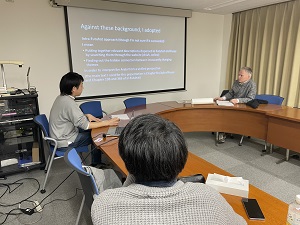News
東文研セミナー “Graduate Workshop: Al-Shaykh al-Akbar and Ustād-i Bashar: Aspects of Mystical Thoughts in Medieval Islam” が開催されました
報告
2024年1 月23日、グラスゴー大学のLloyd Ridgeon氏をコメンテイターとして、東洋文化研究所にて東文研セミナー“Graduate Workshop: Al-Shaykh al-Akbar and Ustād-i Bashar: Aspects of Mystical Thoughts in Medieval Islam”が開催された。本セミナーには本学人文社会系研究科の大学院生2名が報告を行った。まず藤原氏はイブン・アラビー思想における「原初の雲(ʿamā)」と「本質(jawhar)」について、また西山氏はナスィールッディーン・トゥースィーの倫理思想における哲学と神秘主義思想の関連について報告した。本セミナーではコメンテイターや報告者を合わせて6名が対面で参加し、それぞれの報告後には有意義なコメントや質疑応答が行われた。
当日の様子
開催情報
日時:2024年1月23日(火)16:45~19:05
会場:東京大学東洋文化研究所3階第二会議室
発表者:藤原路成(東京大学人文社会系研究科修士課程)、西山尚希(東京大学人文社会系研究科博士課程)
コメンテイター:Lloyd Rigeon (University of Glasgow)
題目1:Ibn ʿArabī’s Theory of Substance and the Primordial Cloud
題目2:Naṣīr al-Dīn al-Ṭūsī’s Ethics and ʾIrfān
司会:水上遼(東京外国語大学)
発表要旨1:
It is relatively known that the Primordial Cloud (ʿamāʾ), where God was before creation, is the cosmological substrate in which all existents appear for Ibn ʿArabī. This Cloud is called the only substance (jawhar) in his cosmogony. Previous studies, however, have not paid much attention to the reason why this is the only substance, or tried to explain it following a commentary of the so-called Ibn ʿArabī circle. This presentation aims to clarify how Ibn ʿArabī himself demonstrates that there is no substance other than Cloud, based on both al-Futūḥāt al-Makkīyah and Fuṣūṣ al-ḥikam. These two books have been rarely cross-referred so far because they are regarded to have different characters. However, the study implies that al-Futūḥāt and Fuṣūṣ are consistent to some degree and can be referred to mutually in some cases.
発表要旨2:
Naṣīr al-Dīn al-Ṭūsī (d. 1274), renowned for inheriting Ibn Sīnā (d. 1037)’s philosophical legacy, shifted from Ismailite to Twelver Imamate amidst the Mongol conquest. During his Ismailite era, he wrote Akhlāq-i Nāṣirī, inspired by Ibn Miskawaih (d. 1030)’s philosophical ethics outlined in Tahdhīb al-akhlāq, while in his later years, he penned Awṣāf al-ashrāf, delving into ʿirfān, or mysticism. Although both discuss the ideal human spirit, their arguments seemingly diverge noticeably. This presentation aims to comprehensively analyze al-Ṭūsī's works, highlighting that, despite his religious conversion, both of his ethical works share the same theoretical framework. Additionally, it underscores that ʿirfān consistently plays a central role in his ethical ideologies across these periods.
登録種別:研究活動記録
登録日時:WedJan3116:13:052024
登録者 :西山・多田
掲載期間:20240202 - 20240502
当日期間:20240123 - 20240123


